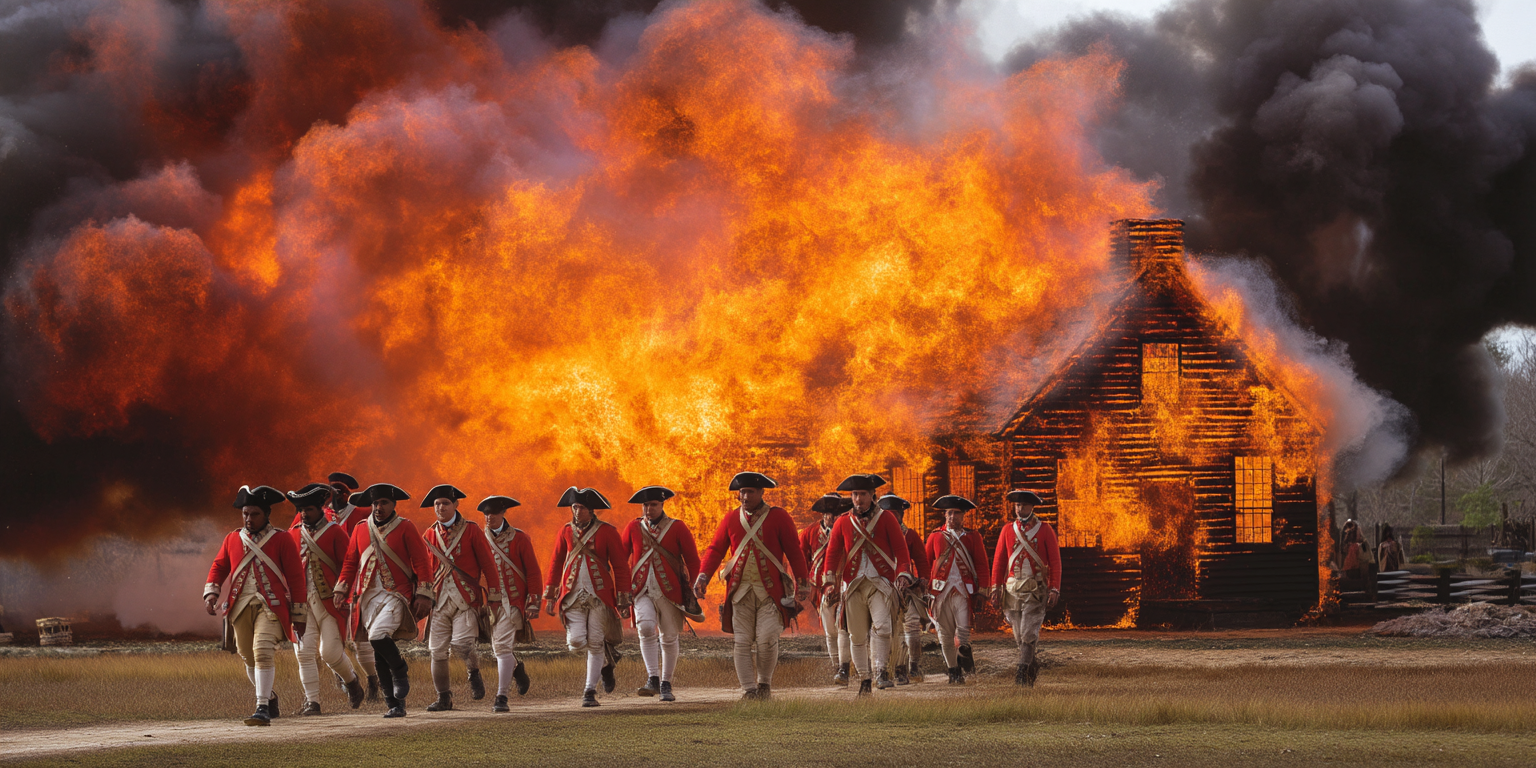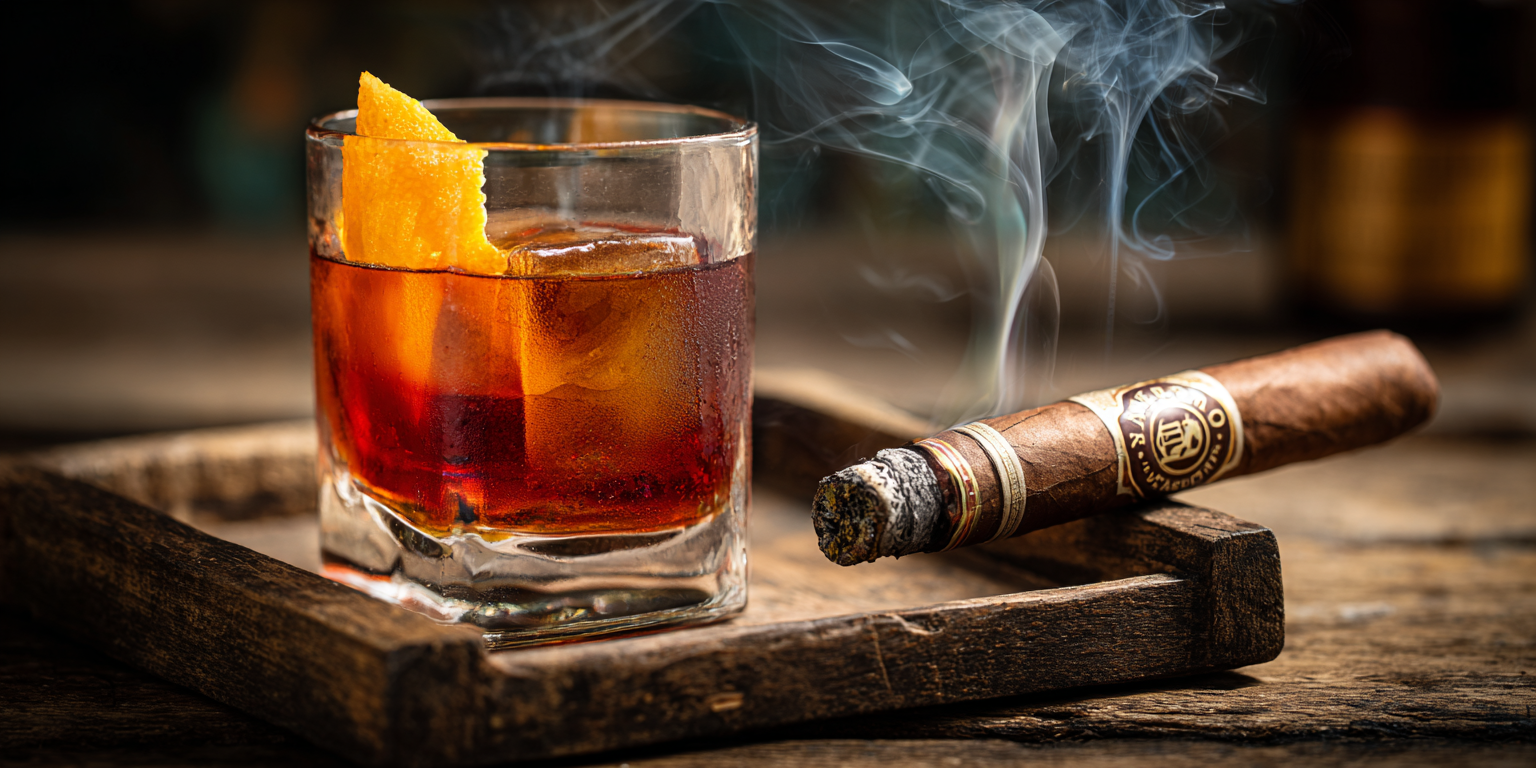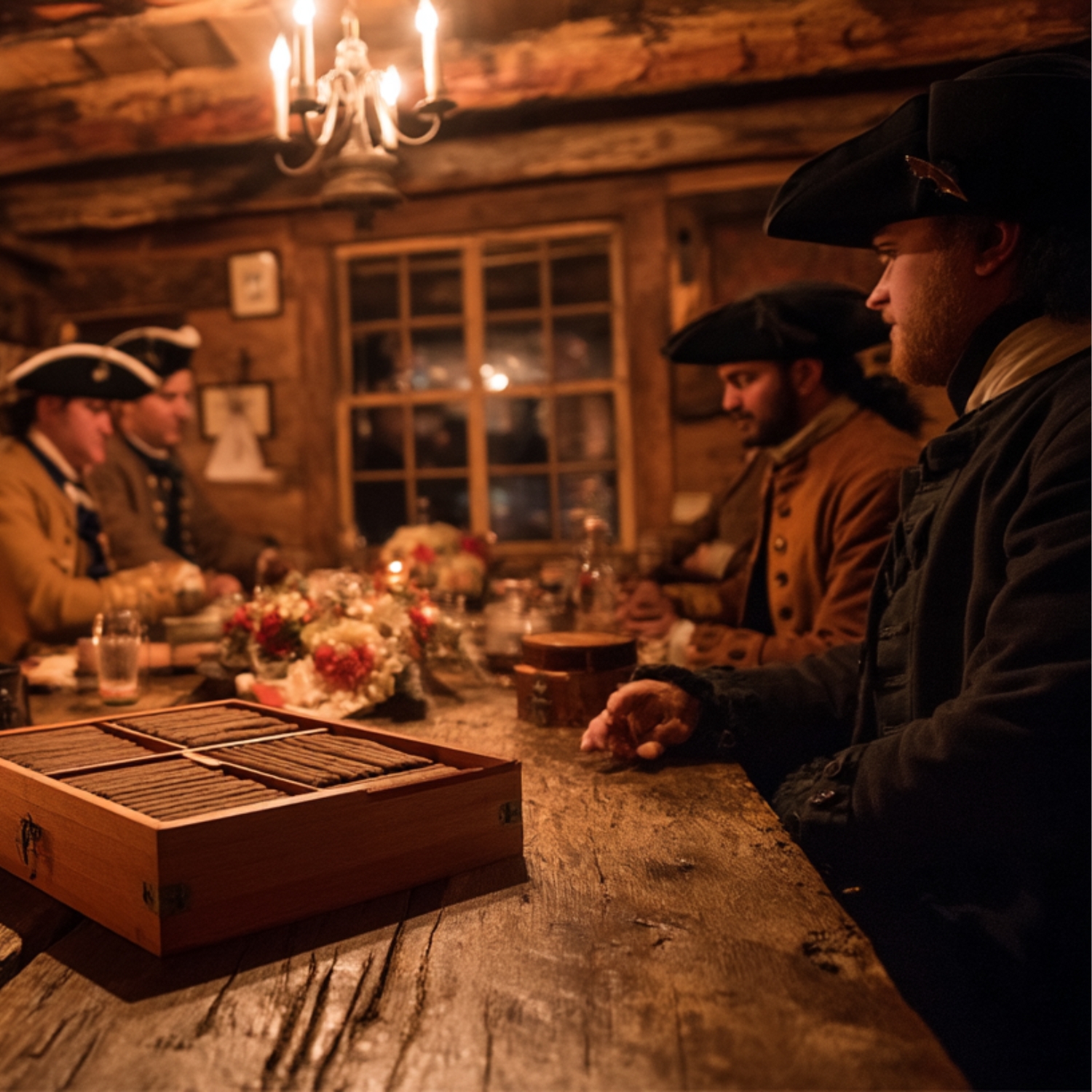Tobacco Wars: How the British Tried to Burn Out the Revolution

Welcome back to Smoke Signals! In this week's blog post, we're diving deep into a fascinating and often overlooked aspect of the American Revolution: the "Tobacco War." As you may have heard in our latest episode, Seeds of Smoke: How the American Revolution Sparked Cigar Culture, the British strategy of targeting Virginia's tobacco warehouses had profound, unintended consequences, ultimately contributing to the rise of cigars as symbols of resilience and defiance in the newly formed nation. Join us as we explore this pivotal moment in American history and discover how the burning of tobacco ignited a cultural phenomenon that continues to this day.
The Tobacco War: A British Strategy
As the American Revolution raged, the British military sought to cripple the American colonies' economy. One of the primary targets was Virginia's lucrative tobacco industry. Tobacco was not merely a cash crop; it was the lifeblood of the Virginian economy, financing the revolution and providing sustenance for many families. The British, under commanders like Lord Dunmore, understood this and implemented a strategy of systematic destruction.
The British strategy involved naval raids along the James River and other waterways, targeting tobacco warehouses. These warehouses, packed with cured and prized tobacco leaves, were easy targets for British troops and naval vessels. The goal was simple: to destroy the colonists' economic resources and weaken their ability to sustain the rebellion. The attacks began early in the war, and the fires from burning warehouses became a common sight throughout Virginia.
The impact of these attacks was far-reaching. The destruction of tobacco warehouses resulted in significant financial losses for the colonists. Planters, merchants, and farmers faced ruin as their crops were reduced to ashes. The loss of tobacco also disrupted trade with Europe, depriving the Americans of much-needed revenue to purchase supplies and weapons. Furthermore, the British hoped to demoralize the colonists by attacking their economic base, thinking that the loss of their livelihoods would force them to abandon the rebellion.
However, the British miscalculated the resolve of the American people. Instead of breaking their spirit, the destruction of tobacco warehouses fueled their determination to resist British oppression. The "Tobacco War" inadvertently galvanized the colonists and turned tobacco, once just a commodity, into a symbol of resistance. The burning warehouses became rallying points, inspiring colonists to fight harder and defend their land and way of life. The scarcity of tobacco, created by the British actions, gave it a new value and meaning among the soldiers and citizens of the colonies.
Israel Putnam's Seeds: The Roots of Connecticut Wrapper
Amidst the chaos and conflict of the Revolution, a fascinating story of innovation and resourcefulness emerged involving General Israel Putnam. A distinguished officer in the Continental Army, Putnam possessed a keen interest in agriculture and a forward-thinking mindset. During his military campaigns, Putnam had the opportunity to sample Cuban cigars. Impressed by their flavor and aroma, he sought to cultivate a similar tobacco variety back in his home state of Connecticut.
Legend has it that Putnam managed to acquire a pouch of Cuban tobacco seeds, carefully preserved and transported during his travels. Following the war, Putnam returned to his farm in Pomfret, Connecticut, and began experimenting with the Cuban seeds. The climate and soil of Connecticut proved surprisingly suitable for growing tobacco. Over time, through careful cultivation and selection, Putnam developed a unique strain of tobacco that became known as Connecticut Broadleaf.
Connecticut Broadleaf quickly gained popularity among local farmers and cigar makers. Its broad leaves and mild flavor made it ideal for use as a wrapper in cigars. The development of Connecticut Broadleaf marked a turning point in American cigar production. It allowed American manufacturers to reduce their reliance on imported Cuban tobacco and establish a domestic cigar industry. The success of Putnam's tobacco seeds laid the foundation for Connecticut's reputation as a premier cigar-producing region, a legacy that endures to this day.
Putnam's actions highlight the spirit of innovation and self-reliance that characterized the American Revolution. His efforts to cultivate Cuban tobacco seeds in Connecticut not only contributed to the development of the American cigar industry but also symbolized the colonists' determination to create a new and independent nation. The story of Israel Putnam's seeds is a testament to the ingenuity and resourcefulness of the American people during a time of great upheaval and uncertainty.
From Scarcity to Symbolism: Cigars as a Sign of Resilience
The British strategy of destroying tobacco warehouses during the American Revolution created a scarcity of tobacco products, including cigars. This scarcity, however, had an unintended consequence: it elevated cigars to a symbol of resilience and defiance among the colonists. In a time of hardship and deprivation, the act of smoking a cigar became a statement of resistance against British oppression.
Despite the scarcity, cigars remained in demand, particularly among soldiers in the Continental Army. They provided a moment of respite from the rigors of war and offered a sense of camaraderie among comrades. Sharing a cigar became a ritual, a way to connect with fellow soldiers and reaffirm their commitment to the cause of independence. The act of lighting a cigar in the face of adversity symbolized the colonists' refusal to be defeated by the British.
As cigars became more scarce, they also became more valuable. They were often used as currency or bartered for goods and services. A good cigar became a prized possession, a symbol of wealth and status. The scarcity of cigars also led to innovation and resourcefulness among the colonists. They experimented with growing their own tobacco and creating their own cigars. This DIY approach further solidified the association between cigars and the spirit of independence.
The symbolism of cigars as a sign of resilience and defiance persisted long after the end of the Revolution. In the new republic, cigars became associated with freedom, independence, and the pursuit of happiness. They were smoked at celebrations, political gatherings, and other important events. The cigar became a symbol of American identity, representing the values and ideals of the new nation. The legacy of the "Tobacco War" lived on in the symbolic power of the cigar, forever linked to the struggle for independence and the resilience of the American people.
Cigar Culture Evolves: From Campfires to Congress
Following the American Revolution, cigar culture in the United States underwent a significant transformation. From its humble beginnings in military campfires, cigar smoking gradually evolved into a sophisticated and widespread pastime. The rise of a domestic cigar industry, fueled by the cultivation of Connecticut Broadleaf, played a key role in this evolution.
As the United States grew and prospered, so did the popularity of cigars. Cigar shops and smoking lounges began to appear in cities and towns across the country. These establishments provided a social space for men to gather, relax, and enjoy a smoke. Cigar smoking became associated with wealth, power, and success. Business deals were often sealed over a cigar, and political discussions took place in the smoke-filled rooms of cigar lounges.
Cigar smoking also made its way into the halls of Congress and other government buildings. Politicians, lawyers, and other influential figures were often seen with a cigar in hand. The image of a cigar-chomping politician became a common trope in American culture. Cigars were used as symbols of authority and influence, further cementing their place in American society.
The evolution of cigar culture was also influenced by the influx of immigrants from Cuba and other Latin American countries. These immigrants brought with them their knowledge of cigar making and their passion for cigar smoking. They established cigar factories in the United States, introducing new techniques and flavors to the American market. The blending of American and Latin American traditions further enriched cigar culture and contributed to its growing popularity.
By the late 19th and early 20th centuries, cigar smoking had reached its peak in the United States. Cigars were a ubiquitous part of American life, enjoyed by people from all walks of life. From campfires to Congress, the journey of the cigar in America was a testament to its enduring appeal and its ability to adapt to changing times. The influence of the American Revolution on cigar culture remained, shaping its symbolism and its association with freedom, independence, and the spirit of innovation.
The Enduring Legacy: A Revolution in Every Cigar
The story of cigars in America is inextricably linked to the American Revolution. The British strategy of targeting tobacco warehouses inadvertently transformed cigars from a simple commodity into a potent symbol of resilience and defiance. The actions of figures like Israel Putnam, who cultivated Cuban tobacco seeds in Connecticut, laid the foundation for a domestic cigar industry. And the evolution of cigar culture, from campfires to Congress, reflects the changing social and political landscape of the United States.
Today, every cigar lit in America carries a trace of the Revolution. It represents the spirit of independence, the resilience of a nation, and the ingenuity of its people. The "Tobacco War" may have failed to crush the American rebellion, but it succeeded in sparking a cultural phenomenon that continues to thrive. As we savor the flavors and aromas of a fine cigar, let us remember the history and the sacrifices that have shaped its legacy.
The American Revolution sparked a revolution in cigar culture, one that continues to burn brightly today. From the seeds of rebellion to the smoke-filled rooms of power, the cigar has become an enduring symbol of American identity. Its journey is a testament to the power of resilience, the spirit of innovation, and the enduring legacy of the American Revolution.
Call to Action: Discover More at Smoke Signals
We've only scratched the surface of this fascinating topic. If you enjoyed this deep dive into the history of cigars and the American Revolution, be sure to check out our latest podcast episode, Seeds of Smoke: How the American Revolution Sparked Cigar Culture, for even more insights and stories. And don't forget to subscribe to Smoke Signals for more tales where cigars, whiskey, and history intertwine. We'll continue to bring you engaging stories and expert perspectives on the world of cigars and beyond. Until next time, keep those fires burning and those cigars smoking!








